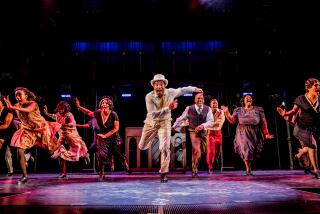MAN WALKING ON EGGSHELLS.<i> By Herbert Simmons</i> .<i> W.W. Norton: 218 pp., $11 paper</i> . : THE BEAR COMES HOME.<i> By Rafi Zabor</i> .<i> W.W. Norton: 480 pp., $25</i>
- Share via
It is a cause for rejoicing that two new novels, both inspired by the world of jazz, have been published at the same time. “Man Walking on Eggshells,” by Herbert Simmons, and “The Bear Comes Home,” by Rafi Zabor, share authentic portrayals of the times, places and people who inhabit a world many know little about. In scenes of triumph and torture, compassion and humor, zest and candor, Simmons and Zabor explore the unpredictable, ever-changing, tragicomic days and nights of jazz musicians and the people in their lives. Ultimately, both offer fresh views of American society as well as an idea of what it was like--and still is-- to survive in a high-tech industrial world and play music that is improvised on the spot and created anywhere and everywhere out of passion for the moment.
Simmons writes of a time and place long gone: an America that has given us musicians, singers, poets, painters, language, a sense of style and a survival philosophy that have enriched the 20th century. In a brilliant, soulful, poetic style, he captures the feelings of the neighborhoods, the sense of community and the sophistication of the streets that provided the wellspring for many of America’s most creative and enduring masters of musical improvisation. We feel as if we are part of a handful of lucky souls at a 2-to-7 a.m. session, listening to great music that will never be heard again in the same way. He takes you backstage with the band and share conversations usually heard only by musicians and their friends.
“Man Walking on Eggshells” is inspired by the music and life of Miles Davis; the title is a quote from a famous description of Davis’ trumpet style. What makes Simmons’ novel so compelling is his daring to create a fictional character based on but as unique as Davis himself, just as jazz soloists use a standard tune as a point of departure to develop an improvised composition based on a melody. Raymond Douglas, the novel’s central character, is an uncompromising artist who journeys through pain and horror, joy and victory and transcends mid-century America’s artistic restrictions.
Simmons’ prose, like jazz, flows in a series of beautifully constructed improvisatory passages of lyrical images, sounds and stories that invite us to wake up and be part of the world from which this music originated--a world that has all but vanished. Thanks to Simmons, this precious part of our history will remain alive in “Man Walking on Eggshells.”
“The Bear Comes Home” achieves the seemingly impossible task of combining fictional and real characters, actual events, music theory, satire and fantasy with ease and panache. The book’s hero, a circus bear, becomes a great jazz innovator on the alto saxophone, paying his dues in a hilarious series of events that fill the pages of this wildly picaresque novel. We join the bear in musical adventures with actual living jazz masters, a trip to jail, disastrous trips on the road and a shattered romance (with a non-bear). The Shakespeare-quoting, sax-playing bear fulfills his search for musical greatness at the end of the book, finally achieving his nirvana.
Zabor’s style is invigorating. Like Simmons, Zabor knows and loves jazz and the world from which it comes. His own experience as a professional drummer and his brilliance as a music journalist give the novel a ring of authenticity. Set in a different time and place than “Man Walking on Eggshells,” “The Bear Comes Home” is like a modern-day “Don Quixote.” Poignant and touching moments combine with hilarious descriptions of the bear’s struggle in a story that anyone--whether familiar with jazz or not--will find compelling and entertaining.
Read together, both books describe the jazz experience. But each book also stands on its own in celebrating the glory and courage of dedicated musicians following their hearts. Just as it is a joy to hear Miles Davis and Charlie Parker play together, each of their solo efforts is equally fulfilling. The same may be said of “Man Walking on Eggshells” and “The Bear Comes Home.” As the music we call jazz is finally finding its rightful place in the country in which it was created, we are ready to embrace a new body of fiction based in the many traditions of this century’s jazz experience.
More to Read
Sign up for our Book Club newsletter
Get the latest news, events and more from the Los Angeles Times Book Club, and help us get L.A. reading and talking.
You may occasionally receive promotional content from the Los Angeles Times.










